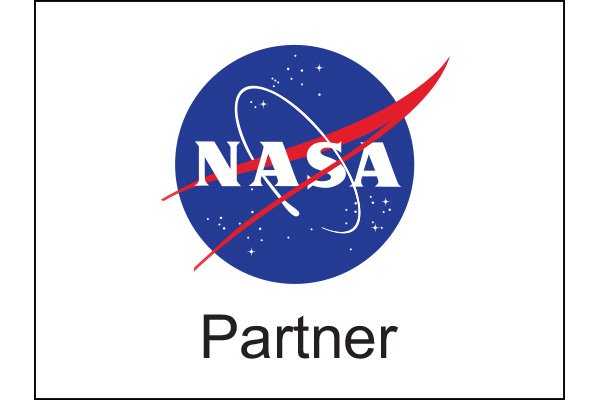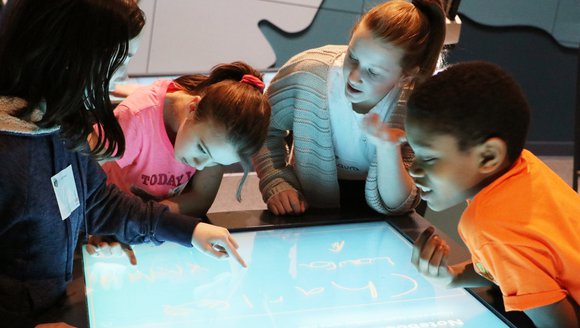2024 – 25 Education Impact Report: 20 Years of Learning
Reports | Sep 3, 2025
Our education team cultivates the next generation of climate-literate ecosystem stewards by engaging students in authentic science inquiry and supporting educators to do the same. Through our integrated educational programs, we immerse students in real ecosystem research that exposes them to the science tools, practices, and role models they need to succeed in school, careers, and everyday life.
This year, we're celebrating 20 years of impact for GMRI and our education team. We launched the first iteration of our LabVenture program in 2005 with “Mystery of the X-Fish," a learning experience centered on Atlantic herring. Since then, we’ve expanded and evolved to address ecosystem shifts in the Gulf of Maine watershed and meet the changing needs of our students, educators, and partner organizations. Read on to learn more about our integrated educational programs and recent accomplishments.
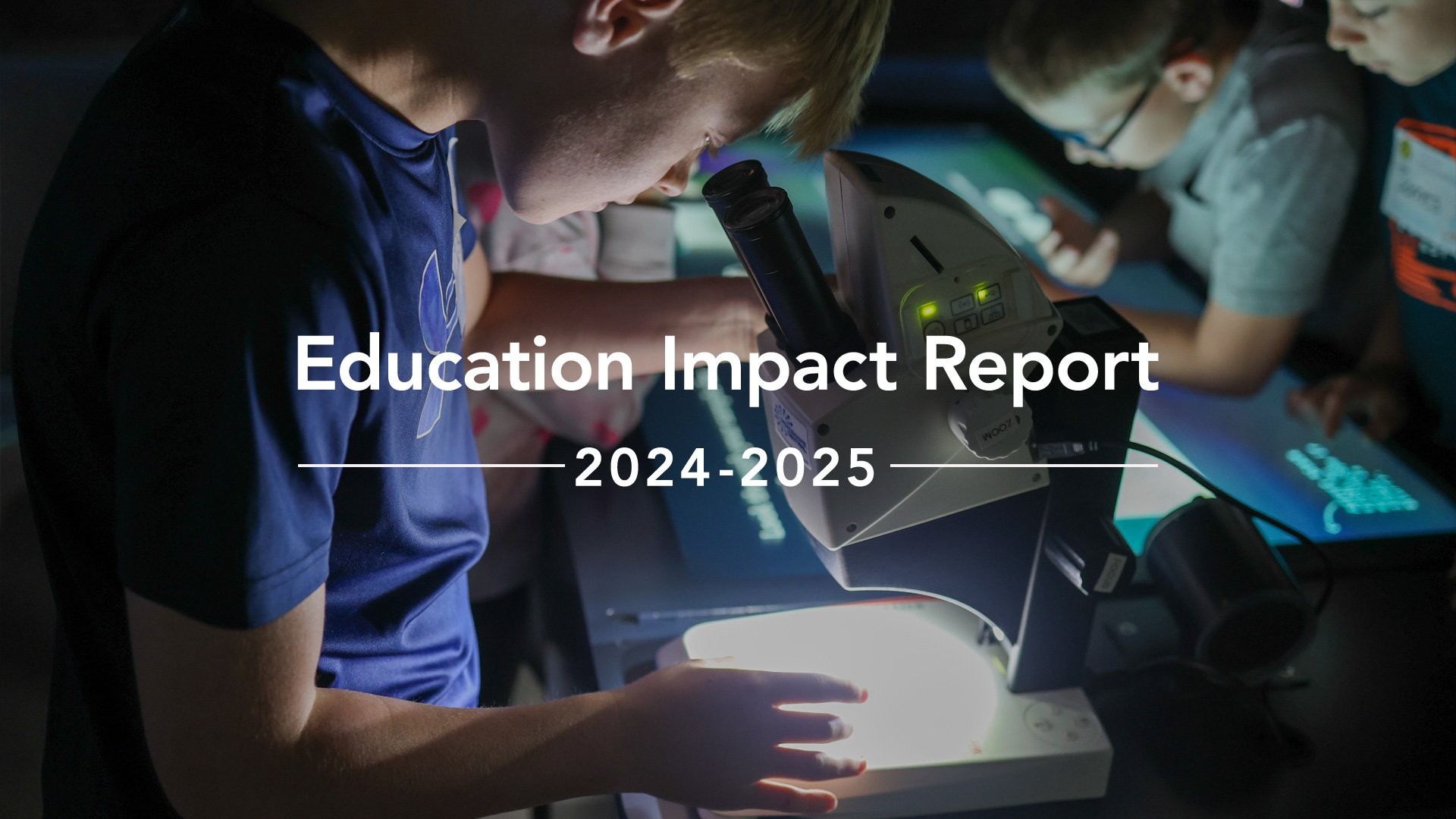
During the 2024 – 25 school year, our education team advanced our integrated approach to support learning in the classroom, lab, field, and beyond. By reaching students across multiple age groups and environments, we increased access to and participation in hands-on learning experiences that strengthen climate and STEM literacy. We provided formal and informal educators with the professional development opportunities, curriculum resources, and networks they need to engage youth in data-rich, authentic science experiences in their own classrooms and learning spaces. We also conducted regular learning science research to generate evidence-based best practices in STEM (science, technology, engineering, and math) teaching and learning, including work by our Learning Sciences Lab to bring modeling into classrooms.
We deeply appreciate the contributions of the many individuals who have made this work possible, including our educator networks, partner organizations, and community of donors. As we look forward to the next 20 years, our education team is particularly focused on supporting the strategic initiatives outlined in our 2025 – 2030 Strategic Plan by building understanding of marine ecosystems and economies, engaging communities in climate-centered science, and introducing youth to diverse career paths in STEM fields. We hope you will join us in looking ahead to the continued evolution of our education work while celebrating recent accomplishments from the 2024 – 25 school year.
Numbers at a Glance
Take a look at some of the metrics we use to measure our impact.
Student Interactions
Across our education programs, we supported climate and STEM learning for thousands of students.
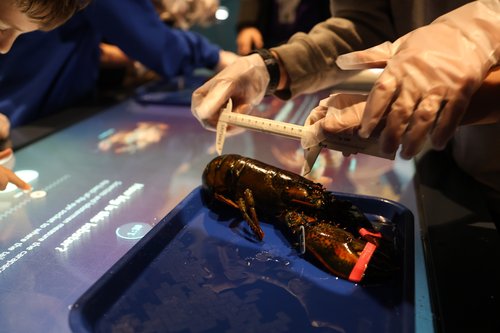
Educator Interactions
We ensured that formal and informal educators have the resources, curriculum, and connections needed to deliver authentic, locally relevant learning experiences.
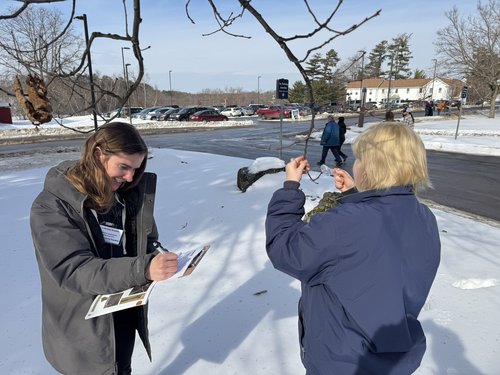
Schools and Organizational Partners
We collaborated with schools and educational organizations across the Northeast to reach students in every step of their learning pathways.
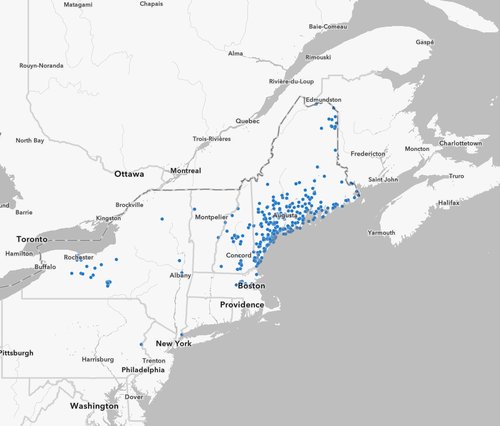
LabVenture
LabVenture is an immersive experience that sets students on the path of engaging in scientific discovery with confidence, competence, and curiosity. This program brings early middle school students from across Maine to our Cohen Center for Interactive Learning, where they become scientists for a day. We are proud to have reached our goal to host 70% of Maine’s fifth and sixth grade cohort through LabVenture this past school year, including students from all 16 counties. To ensure equitable access to STEM education for all students, we hosted all eligible schools from Lewiston Public Schools and Portland Public Schools — both of which have significant New Mainer (asylee, immigrant, and refugee) populations — and reached two of the three schools in the Wabanaki school system. We also continued to provide free transportation for all participating public schools, ensuring access for Maine’s rural communities.
The upcoming 2025 – 26 school year will mark LabVenture’s 20th anniversary and our lifetime reach on over 175,000 students across Maine. We will celebrate this achievement alongside the LabVenture staff, participating educators, and supporters who make this program possible each year. The LabVenture team is constantly reinventing the program to reflect new approaches, and plans are already on the drawing board for the next iteration of LabVenture’s curriculum and program delivery.
LabVenture Numbers at a Glance
Students Engaged
In the 2024 – 25 school year, we supported STEM learning for 70% of Maine’s fifth and sixth grade cohort.
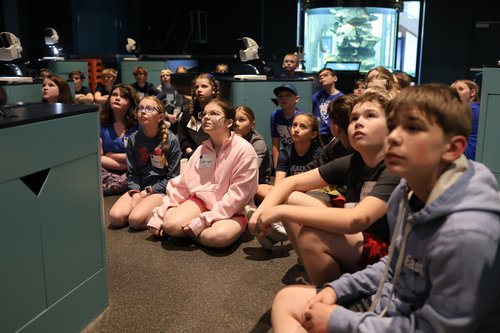
Schools Served
Schools from across Maine joined us in our world-class Cohen Center for Interactive Learning.
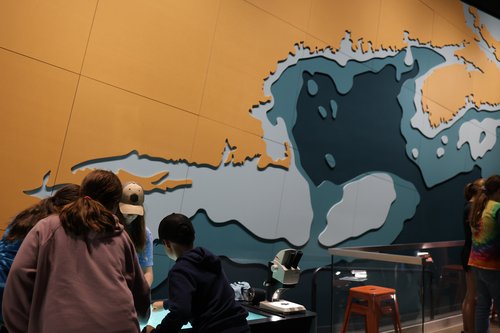
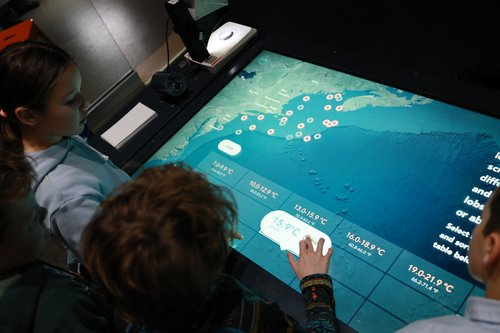
Supported Climate Learning
The majority of surveyed educators agreed or strongly agreed that LabVenture supported learning about climate and ecosystem change.
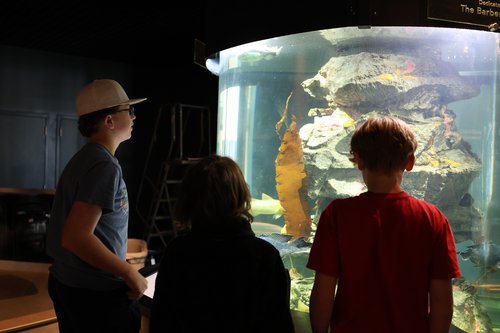
Enjoyed Science
The majority of surveyed students indicated that they liked or ‘kinda’ liked learning about science during LabVenture.
It was SO fascinating to learn about Maine's marine life and climate change, and how we can help restore the Gulf of Maine and marine life in general! I love having opportunities like this to not only learn something new, but listen, explore, and socialize with my friends and peers. I learned and made memories of things I will NEVER forget.
Josie, Student LabVenture Participant
Community Science
In order for science learning to have meaningful, lasting impacts, we must help students relate science to the world around them. Our Community Science program achieves this by supporting educators to lead students through authentic investigations of vernal pools, intertidal zones, forests, and other local ecosystems in their communities.
In the 2024 – 25 school year, we worked with educators to engage students in field work and stewardship actions across a diverse range of ecosystems, from rocky intertidal zone and coastal mudflats to vernal pools and inland forests. Along the coast, students monitored populations of invasive crab species (e.g. Asian shore and European green crabs) and documented the impacts of flooding and sea level rise in their communities. In forested landscapes, students worked alongside educators, professional scientists, and community leaders to observe and steward two critical tree species: hemlock and brown ash. In total, students collected 1,533 data points that will be used to advance our understanding of ecosystems in the Gulf of Maine’s watershed.
Community Science Numbers at a Glance

Students engaged
We reached students in their communities to ensure that they can conduct scientific inquiries into the ecosystems that matter to them.
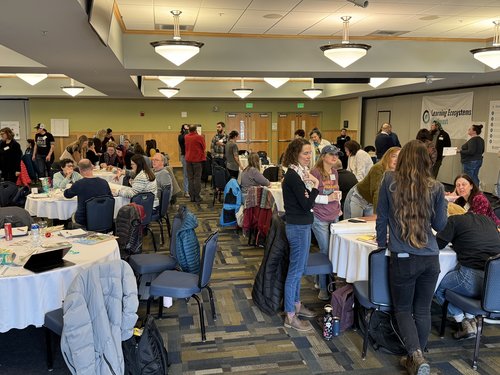
Educators Supported
Our education team provided professional development opportunities for educators looking to connect their students to authentic scientific work.
Meaningful Science Engagement
Nearly all surveyed educators agreed or strongly agreed that the program helped introduce meaningful and relevant science learning experiences in their classrooms.
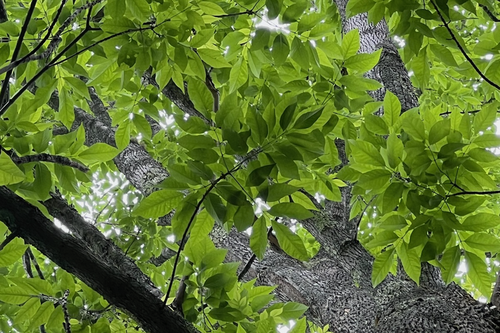
Making a Difference
The majority of surveyed students reported believing that their community could make a difference in their local environments by participating in community science.
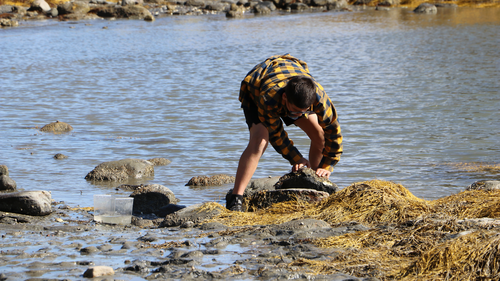
GMRI has been instrumental in my teaching and provided support in countless ways. They are helping me educate students who leave my classroom not just knowing some facts about science, but further understanding how science affects them in their community.
Katrina Heimbach Educator Sacopee Valley Middle School
Findings from the Field
Findings from the Field (“Findings”) is a peer-reviewed scientific journal featuring environmental investigations conducted and written by middle and high school students. Launched in 2017 in collaboration with a community of student scientists and teachers across Maine and New Hampshire, Findings gives students the opportunity to engage in and communicate about real scientific questions.
In the 2024 – 25 school year, we worked with educators to engage 277 students in Findings across the writing, review, and publication processes. We published Findings: Volume 8 in Summer 2025 and introduced “Expressions of Two-Eyed Seeing,” a publication type supported by a collaboration of Indigenous and Western science educators and inspired by the Mi’kmaq principle of Etuaptmumk, or Two-Eyed Seeing. We also hosted our second in-person Findings Research Symposium in March 2025, which brought together scientists, educators, and nearly 100 young scientists to share their scientific observations and discoveries. This symposium gave students the opportunity to present their research, discuss their observations with community volunteers from Unum and Avangrid, and connect with researchers from GMRI, the University of New England, and other organizations.
Findings Numbers at a Glance
Students Engaged
Students worked together to conduct, reflect on, and share scientific investigations in the Findings journal and at the research symposium.
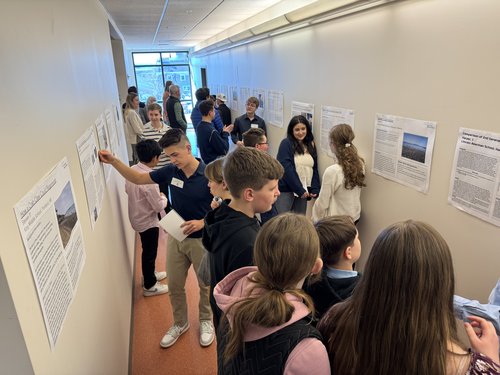
Educators Supported
Our education team provided professional development opportunities for educators looking to connect their students to authentic scientific work.
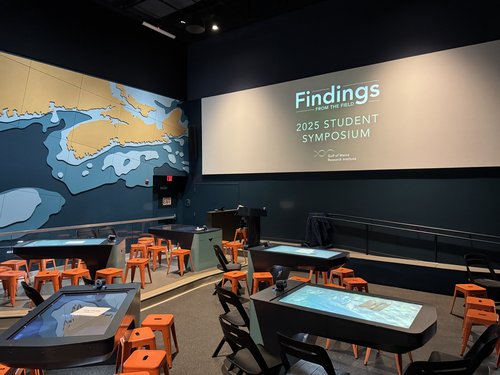
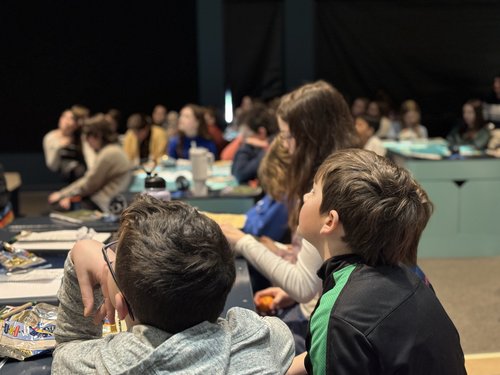
Improved Observation Skills
The majority of surveyed educators agreed or strongly agreed that Findings equipped them to support youth in developing scientific observation skills.
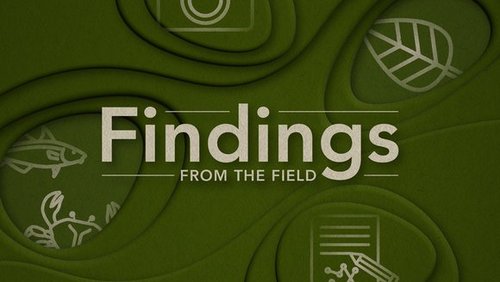
Student Publications
Student contributions to the journal undergo a process of peer and editorial board review before publication.
It makes me feel really proud because I get to talk to professional scientists that have a lot of experience in this and it make me feel like I am contributing to something bigger [than my school and my community].
Madalyn, Student Findings from the Field Participant
Scientist to Go
Scientist to Go is a virtual lecture series that allows students to meet and interact with visiting scientists and learn more about a wide array of scientific fields and kinds of scientific work. This program exposes students to a diverse group of scientists and science career paths and demonstrates science in ways that students may not see in a traditional classroom setting. In the 2024 – 25 school year, we hosted 10 Scientist to Go webinars on topics including marine science and data analysis, terrestrial ecology, meteorology and coastal dynamics, sustainable fishing practices, community climate resilience planning, and experience maintaining the International Space Station from Earth; recordings of these webinars are available on the Scientist To Go website.
Scientist To Go Numbers at a Glance

Webinars
We hosted 10 webinars featuring experts from a range of scientific fields.
Students Engaged
Thousands of students tuned in to hear scientists talk about their areas of expertise.
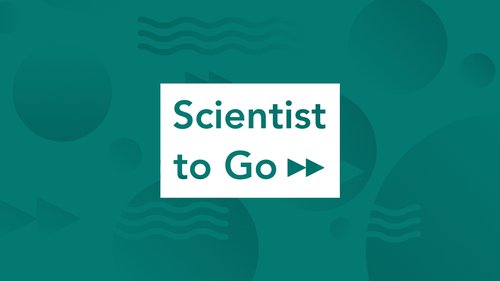
Learning Ecosystems Northeast (LENE)
Our Education team believes that youth deserve meaningful opportunities to engage in STEM both in and out of the classroom. That belief drives our commitment to Learning Ecosystems Northeast (LENE), a partnership of organizations that together equip educators across the Northeast with tools, knowledge, and community to create inclusive, place-based, data-driven STEM learning experiences. We support LENE’s network of Connected Learning Ecosystems (CLEs) by bringing educators together for collaboration and professional development events where they learn from and with each other and share resources, ideas, and experiences.
LENE currently includes 18 CLEs across the Northeast, including eight Maine-based CLEs. In total, LENE reaches 214 educational organizations – including schools, libraries, science centers, and nonprofits – and supports 469 informal and formal educators working to build climate literacy. We encourage you to visit our recent story on the impact of LENE to hear educators’ perspectives about the role that LENE and CLEs have played in their teaching practice.
LENE Numbers at a Glance
Connected Learning Ecosystems (CLEs)
LENE supports 18 CLEs throughout the Northeast, including 8 CLEs in Maine.
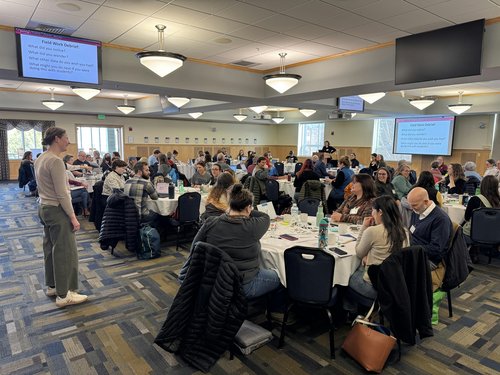
Educators Supported
LENE provides professional development and networking opportunities to educators across Maine and the Northeast.
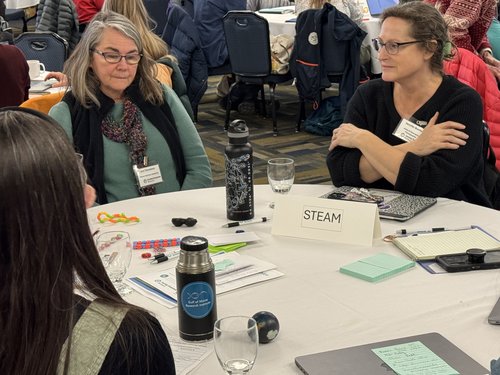
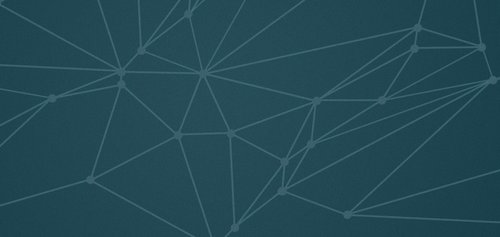
Fostering Peer Connections
The majority of surveyed educators agreed or strongly agreed that participation in a CLE helped them connect with a community of educator peers.
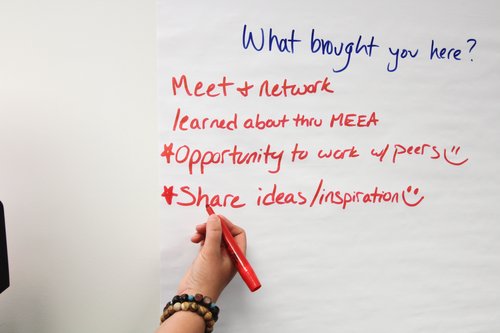
Sustaining Energy
The majority of surveyed educators agreed or strongly agreed that participation in a CLE helped them sustain their energy and creativity.
The opportunities afforded to me as part of my involvement with GMRI, Aroostook CLE, and the LENE network have elevated my teaching in ways I never could have predicted. If you are a Maine educator with connections to STEM, I highly recommend finding your local CLE.
Laurie Spooner, Van Buren District Secondary School Science Teacher
Appendix: Our Education Supporters
We’re deeply appreciative of the many supporters who make this work possible, including the federal, corporate, and foundation sponsors listed below and our generous individual contributors.
Federal Sponsors
This material is based upon work supported by the National Aeronautics and Space Administration under Cooperative Agreement No. NNX16AB94A issued through the Science Activation program at Science Mission Directorate.
This material is based upon work supported by the National Science Foundation under Grants No. 2010119 and 2115603. Any opinions, findings, and conclusions or recommendations expressed in this material are those of the author(s) and do not necessarily reflect the views of the National Science Foundation.
Additional Corporate and Foundation Supporters
- Avangrid Foundation
- Bank of America Charitable Foundation
- Bath Iron Works
- Bath Savings Institution
- Charles C. Butt
- Charles E. Miller Foundation
- Cianbro Charitable Foundation
- Clark Insurance
- George P. Davenport Trust Fund
- Hoyt Charitable Foundation
- Hyman Family Foundation
- John T. Gorman Foundation
- Katahdin Trust Company
- Kennebunk Savings Bank
- Kettering Family Philanthropies
- Kleinschmidt Group
- Machias Savings Bank
- Marr-Anderson Family Foundation
- MMG Insurance
- Norway Savings Bank
- Old Bug Light Charitable Foundation
- P.W. Sprague Memorial Foundation
- Pond Family Foundation
- Portland Pipe Line Corporation
- RBC Wealth Management
- Renys
- Saco & Biddeford Savings
- Skowhegan Savings Bank
- The Alfred M. Senter Fund
- The Margaret E. Burnham Charitable Trust
- The Onion Foundation
- The Reny Charitable Foundation
- The Robert and Dorothy Goldberg Charitable Foundation
- The Robert G. and Jane V. Engel Foundation
- The Seth Sprague Educational and Charitable Foundation
- Wayfair
- Windover Foundation
We also work closely with a team of committed partners and vendors who are critical in executing our program: Cyr Bus Lines, Custom Coach, and Upswell.
Thanks to our Endowment Supporters:
In addition to the annual supporters listed above, LabVenture is made possible by an endowment seeded by the Lunder Foundation in 2015 and the contributors who have invested in the legacy of this program and its impact. 2024 – 25 endowment contributors include the Sam L. Cohen Foundation, who has been a key supporter of LabVenture since 2005.
